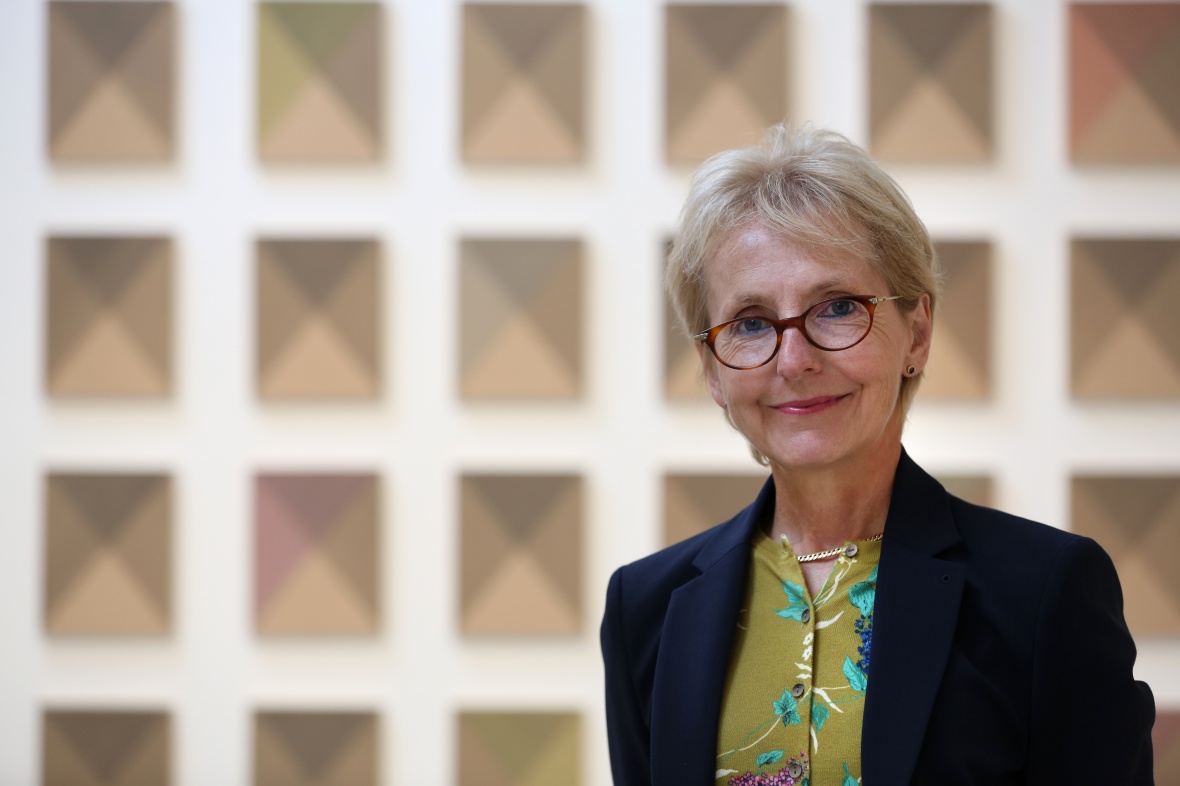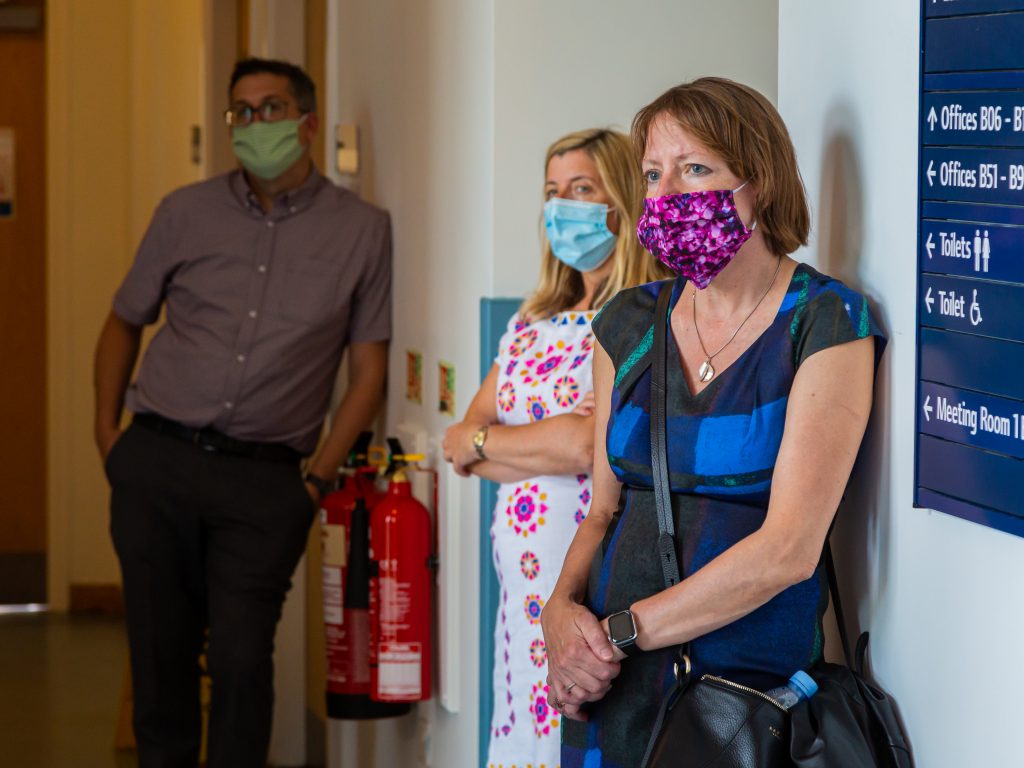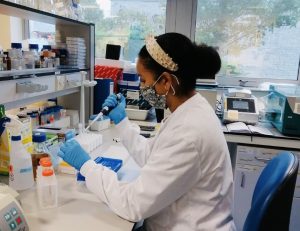
August 7, 2020, by Rob Ounsworth
On track to reopen all major research facilities by September
COVID-19 update from Professor Dame Jessica Corner
I am delighted to confirm that the University is on track to reopen all our major research facilities by the beginning of September. This is the result of tremendous hard work and a team effort in the truest sense, with colleagues coming together to tackle an unprecedented and complex challenge.
We are scaling up research activity, allowing further projects and programmes to recommence, and enabling growing numbers of researchers and postgraduate research students to return to both on-campus activity and field studies.
Our Vice-Chancellor, Professor Shearer West, has visited the Vet School at Sutton Bonington, as well as the Biodiscovery Institute and the School of Chemistry on University Park, to see researchers back in their labs, review social distancing measures and thank key workers. Professor West reflects on her visits in her latest VC blog.
You may also be interested to read about Dr Sarah Cripps’ experiences in preparing the Vet School for reopening and welcoming students back for in-person teaching, while Nottingham Research Fellow Toshana Foster also reflects on going back into the school’s labs as she continues her research as a member of the University’s One Virology team.
Toshana experienced the stresses and worries many researchers felt during lockdown but says of the enforced exile: “Like many, we are keen to make an academic contribution to the pandemic and so this time also allowed us to form connections, share ideas and develop resource plans towards these efforts.”
I firmly believe that such a shared sense of purpose will ensure the University will be fully ready to continue to contribute to the world-class research and development essential to the UK’s recovery from COVID-19.
More on the return of research
For more on the next steps for research to our UK campuses, please see this updated summary on our Research and Innovation COVID-19 resources pages.
We are looking at increasing building capacity through more efficient use of space and by extending operating hours – see the schedule of building reopening. The Health and Safety team is assessing the implications of new social distancing guidance (one metre plus), while guidance on international travel is also being updated. More information on these topics will follow.
Please continue to work at home until notified. Even if the building in which you work reopens, you must be given approval to return to campus.
Health, safety and welfare
Our buildings are being checked for ventilation and cleanliness before opening, and the building safety measures on staffing numbers and social distancing will help to protect you. Once open, our buildings are disinfected regularly and additional handwashing and sanitising facilities provided.
This video highlights safety measures on our campuses.
Remember it is University policy to wear face coverings inside all University buildings. Specific personal protective equipment (PPE) will be provided where required.
James Cameron-Gifford Library reopening
James Cameron-Gifford Library at Sutton Bonington Campus will be the next library building to reopen on Monday 17 August, subject to final approval from Health and Safety and Estates.
As with Hallward Library, James Cameron-Gifford Library will initially be open for book returns, online scanning requests and click-and-collect access to print items on the shelves.
For more information about click and collect and the phased reopening of our library buildings, visit the Libraries website.
UKRI funding for costed research grant extensions
As the Vice-Chancellor acknowledges in her update, researchers have been understandably frustrated at the impact on their work caused by lockdown, and we recognise that the funding implications for delayed projects are a key concern.
As you may be aware, the University has received confirmation from UKRI of funding for costed grant extensions, plus approval for the re-purposing of existing grants.
Following further guidance from UKRI, we are finalising our approach for allocation of funds across the disciplines. Whilst UKRI has given us flexibility in how the funds are distributed, we do need to work within certain parameters, including EDI criteria and ensuring that costed extensions are allocated in a consistent and transparent way. As such, a governance plan has been developed and will shortly be submitted to UKRI for approval.
Eligible grant holders will be contacted by Research and Innovation during August and September with an immediate priority and focus from UKRI on grants ending before 31 March 2021.
Whilst this additional support is very welcome, it will only support a proportion of the grants that have been impacted by COVID-19. Investigators should therefore continue to consider all other possible mitigations to manage delays on grants, including continuing to access the government’s Coronavirus Job Retention (furlough) scheme, as well as no-cost extensions, re-profiling budgets or revising work plans. If you have any immediate concerns about delays on your grant, please do contact your local support team or Research and Innovation post award coordinator for support.
REF2021
I wish to extend my thanks to all the colleagues who have worked tirelessly towards completing our REF2021 staff return, which records all eligible research-active staff and maps them on to units of assessment. This is an integral part of Research England’s assessment of the University’s REF2021 submission, and while other key dates have been revised in light of the pandemic, the staff census deadline of 31 July 2020 remained unchanged. It is a testament to planning ahead of this crisis and continuing hard work of all colleagues that we remain in good shape for REF2021.
Nottingham’s REF delivery plan is currently being revised, following the confirmation of the submission deadline of 31 March 2021, and the publication of Research England’s new guidance on the confirmed modifications to outputs, impact and environment submissions, revised REF timetable, contingency planning and other relevant details.
New chair for Research Integrity and Research Ethics Committee
I am delighted to announce the appointment of Professor Penny Gowland as Chair of the University Research Integrity and Research Ethics Committee.
Penny brings a wealth of experience to this role and is highly regarded and respected as a scientist and a leader. She has chaired a wide range of committees within the School of Physics and Astronomy, the University, and national and international organisations.
Resources and contact information on research ethics and integrity
Digital research
Following a recent town hall meeting for postgraduate research students, there was feedback around difficulties in accessing software and data remotely. Working with a number of postgraduate researchers, our digital research specialists have helped explore a variety of technical options and found solutions that are available to the entire community.
The Digital Research SharePoint site has also undergone a complete refresh and now contains up-to-date information on all the services and guidance available to researchers. This includes data storage solutions, high-performance computing, the Automated Transcription Service, and research data management.
Knowledge exchange
The University has successfully renewed our relationship agreement with Unilever. This was officially signed by Professor Kevin Shakesheff and underlines one of our important partnerships we work together to face current challenges.
The third in a series of business partner programme virtual roundtable meetings took place this week, focusing on ‘leadership and inclusion post-pandemic’. It was led by Dr Theresa Simpkin of Nottingham University Business School and follows meetings on mental health and the pandemic, chaired by Chief Financial Officer Margaret Monckton, and the economic impact of COVID-19, chaired by Professor Paul Mizen. Attendees have included leading figures from BioCity, Browne Jacobson, Capital One, East Midlands Airport, Rolls-Royce, Capital One, Experian and Boots.
Congratulations to our researchers
My warmest congratulations to our renowned expert in Viking and Old Norse Studies, Professor Judith Jesch, who has been made a Fellow of the British Academy in recognition of her outstanding work in the field.
Professor Rachel Gomes has been awarded a Vice-Chancellor’s Medal in recognition of her contribution to research impact and civic engagement. Alongside her ground-breaking research into water processing, Rachel works with Papplewick Pumping Station to engage children about the role of water and engineering in our lives. The award follows Rachel’s recognition as one of the Top 50 Women in Engineering for 2020.
A national project led by Dr Beth Montague-Hellen, of the Libraries Research Support Team, has been awarded a prestigious Athena Prize by the Royal Society, which celebrates contributions to the advancement of diversity in STEM. Beth, who supports the Faculty of Engineering, and Dr Alex Bond, a senior curator at the Natural History Museum, developed a successful network for LGBTQ+ people working in STEM fields.
Our researchers continue to play a significant role in the current crisis, from findings that suggest natural immune responses could help in the fight against COVID-19, to studies on the impact of the pandemic, from BAME health workers to organised crime.
Vice-Chancellor Professor Shearer West has meanwhile extended her congratulations to 150 colleagues who have secured promotion to professor, associate professor, principal research fellow, assistant professor and senior research fellow.
Finally, I would like to share interesting examples of how researchers from the arts and humanities are applying research to contemporary issues or engaging with new audiences.
From the School of English, Thomas Legendre presented ‘Do Try This at Home: Armchair Archaeology and Physical Fiction’ at the 5th Public Archaeology Twitter Conference (#PATC5). In a string of tweets, Thomas gave insights into his archaeology-inspired novel, Keeping Time.
Funded by an ESRC Impact Accelerator Award, Professor Sarah Badcock of the Department of History and colleagues from the schools of English, Humanities and Geography are working with the city council to survey and contextualise the statues, plaques and street names of Nottingham that commemorate links to transatlantic slavery.
History’s Director of the Institute for the Study of Slavery, Dr Sheryllynne Haggerty, is meanwhile leading an independent report into any links between the founder of the Guardian newspaper John Edward Taylor and transatlantic slavery.
My very best wishes to you and your loved ones, and thanks once again for your continuing hard work and dedication. I hope you are managing to have a break away for some very much-needed rest and relaxation after such a challenging year.
 Professor Dame Jessica Corner
Professor Dame Jessica Corner
Pro-Vice-Chancellor for Research and Knowledge Exchange
No comments yet, fill out a comment to be the first



Leave a Reply